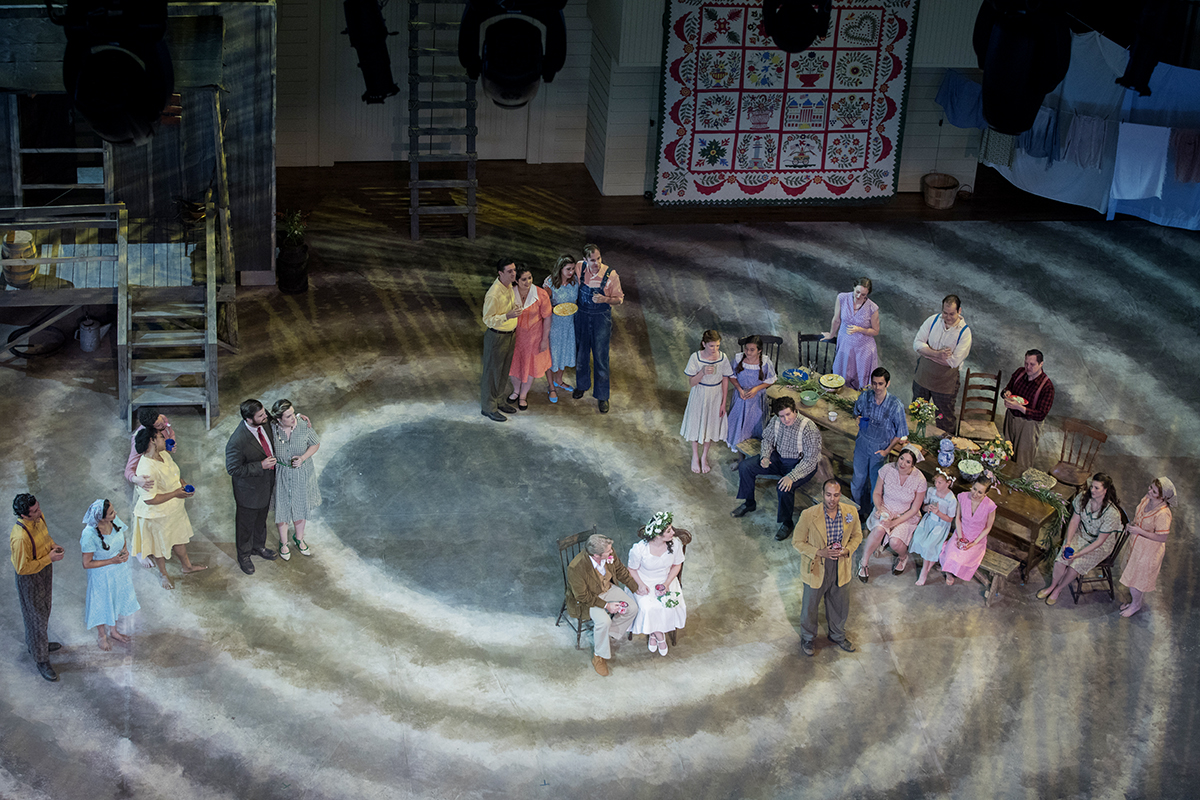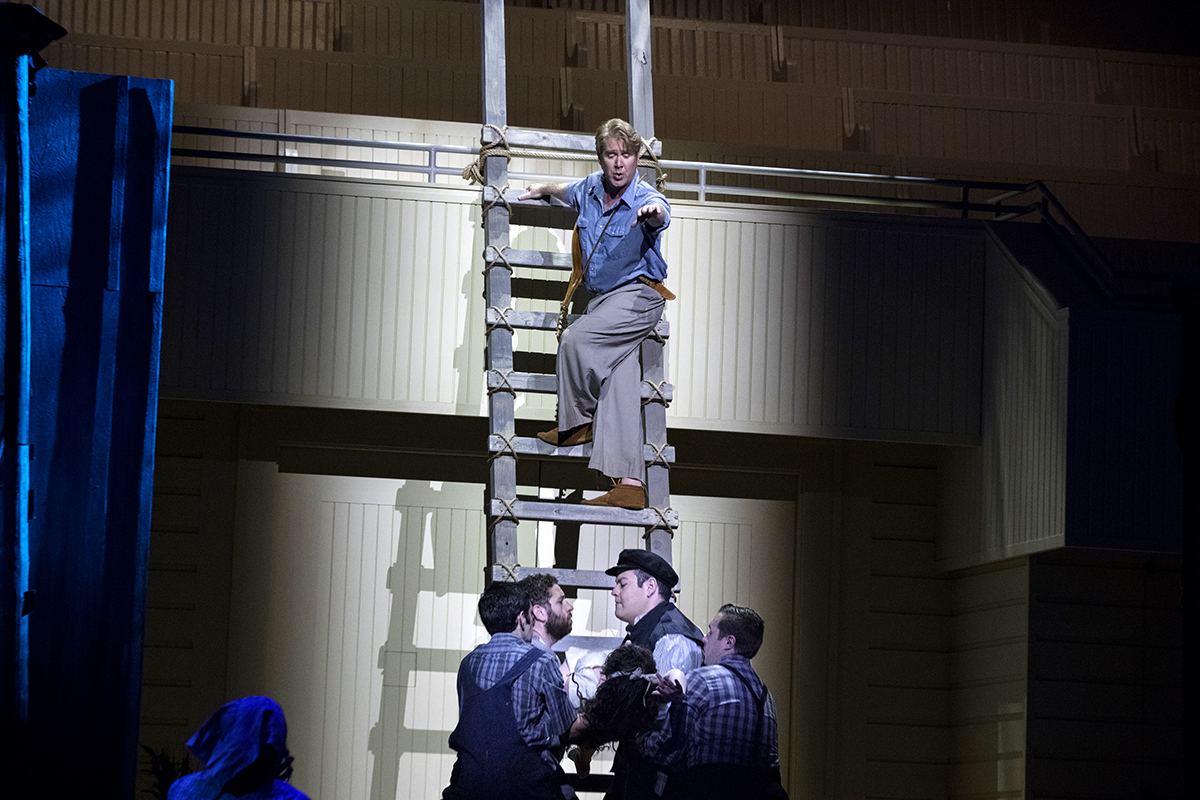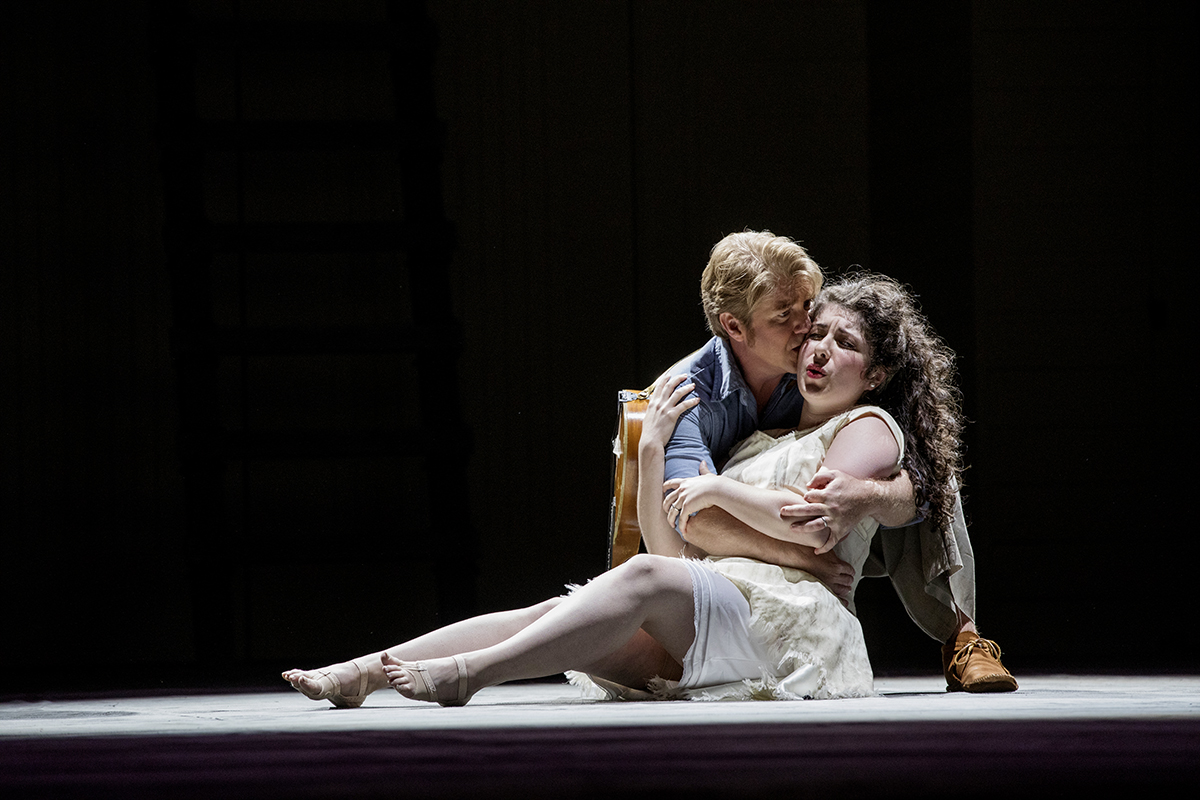Claudio Monteverdi’s L’Orfeo of 1607 is not literally the first opera ever composed, but it certainly is the first one that is still performed, studied, and truly matters. On Saturday evening the work received its first performance at the Amphitheater, the earliest opera (by far) that the Chautauqua Opera Company has ever presented. The version performed, however, was a “free” reimaging by Ottorino Respighi dating from 1935, which makes it ultimately much more a work of the mid-20th century than of the early 17th. Respighi remarked that his adaptation should be “above all in the spirit of our time.” That time, of course, was fascist Italy, and he put Monteverdi’s delicate masterpiece on a heavy dose of steroids to ratchet up the splendor and popular appeal.
The idea of presenting staged performances of operas in the Amphitheater goes back a century, before the inauguration of Norton Hall in 1929. Since the financial crisis of 2008, a production in July has become an annual event. Saturday was notable because it was the first time the pit orchestra was truly playing in a pit. The reconstruction of the Amphitheater now allows an extended stage when elevated and a large pit when lowered, with the orchestra recessing below the stage. This offers exciting possibilities for the future. Acoustics and ambient sounds this summer are in flux as crew and musicians adjust to the new conditions, but the experience on Saturday was very promising.
The humanist revival of interest in classical antiquity led around 1600 to the invention of opera in Italy. The story of Orpheus (Orfeo), the supreme lyric musician, proved a perfect theme for the earliest operas. Through the power of music he wins the love of Euridice. After she dies of a snakebite, he descends to the Underworld to bring her back but loses her again when he defies a decree not to look at her. The 1609 published score ends relatively happily as his father Apollo unites the lovers in the heavens, but Respighi adapted the original 1607 libretto in which the community expresses continued fury.

Monteverdi wrote his “fable in music” for the Gonzaga family in Mantua, and it was first performed there in the ducal palace. The work was rather soon forgotten and only revived in the early 20th century. Resurrecting an intimate 300-year-old curiosity was not easy and most productions were abridged and modernized, using much larger orchestral forces. Vincent d’Indy created a version for Paris in 1904, as did Carl Orff in Germany some 20 years later. In 1934 Giacomo Benvenuti crafted one for Rome a year before Respighi’s appeared at La Scala in Milan. All these efforts took enormous liberties with Monteverdi’s original.
The imaginative staging at Chautauqua was directed by Keturah Stickann, who set the tale not in ancient Greece, but in mid-century America — “Home Sweet Home” was displayed on the side of the couple’s house. (Aaron Copland’s “Appalachian Spring” with Martha Graham’s choreography kept coming to mind.) Stickann made excellent use of the Amphitheater space, with surround-sound positioning in the prologue for a humming chorus (shades of Puccini’s Madama Butterfly) and effectively integrated the action between stage and the choir loft throughout. The “happy and sad songs” promised at the start of the opera resonated with joyous choruses and dances when appropriate, turning to the mournful and melancholy upon Euridice’s death.
Respighi was a brilliant musical colorist whose well-known orchestral trilogy registered his impressions of the fountains, pines and festivals of Rome. He was much drawn to the music and visual arts of the distant past and used lute and keyboard pieces from the 16th to 18th centuries his three sets of “Ancient Airs and Dances” and “The Birds,” as well as Gregorian chant in his “Concerto gregoriano” and “Church Windows.” (The CSO will perform his “Botticelli Triptych” later this summer.)
The practice of updating musical pieces to make them more attractive to new audiences is a time-honored tradition. Mozart, for example, updated the orchestration of Handel’s “Messiah” and later 19th-century “heavy metal” versions of that oratorio allowed large orchestras to compete with massive choral forces numbering hundreds of singers. Respighi’s L’Orfeo, a “free interpretation” as he called it, offers quite a radical rethinking of the piece that extends far beyond beefing up the size of the orchestra and Claudio Guastalla tweaking the words of Alessandro Striggio’s original libretto. (Saturday’s performance was sung in Italian with projected supertitles.) Significant parts of the opera are cut or added, especially at the beginning and ends of acts. To make for a grand ending to the first act, Respighi imported another piece by Monteverdi, “Chiome d’oro” from his Seventh Book of Madrigals.
Respighi left Monteverdi’s simple vocal lines pretty much intact, which 17th-century singers would have heavily ornamented. A sample of the expected elaborate vocalizing can be heard in the opera’s centerpiece, Orfeo’s aria “Possente spirto,” sung as he tries to gain entry to the Underworld. Monteverdi wrote two versions of this aria — one with the melody unadorned and the other a highly ornamented alternative. Respighi uses the fancy version, and I wondered why he did not do more with the vocal parts elsewhere.

The cast was strong, notably Daniel Belcher in the title role and Heather Johnson singing the multiple roles of La Musica, the messenger Silvia, and Speranza. Apprentice Artist Chelsea Friedlander was Euridice and others from the apprentice and studio artist program rounded out the cast and chorus, excellently prepared by Carol Rausch. General and Artistic Director Steven Osgood led a compelling performance that deftly negotiated the orchestra in the new pit with the singers placed sometimes at considerable distances around the Amphitheater. The large orchestra provided the pomp Respighi desired, conveyed as well by the slow tempi he marked in the score. (We do not know what Monteverdi wanted in this regard as he did not indicate any.)
In what was billed as the American stage premiere of Respighi’s version, Chautauquans had the welcome chance to experience something unusual in a well-performed and inventive staging. Ten years ago, Osgood had conducted the piece in a concert performance in Virginia and he clearly believes in this version. Respighi’s monumentality is shocking in comparison with the restrained dignity of Monteverdi’s score in which every pitch, melodic contour and rhythmic inflection mirrors the words. That was this great composer’s innovation: not the lively songs and dances, but rather the nuances of the recitatives.
In an interview in the Daily, Belcher commented on singing Respighi’s version after being a veteran of the original, occasionally recognizing an “old friend … but most of the time it feels like a completely new piece.” It is indeed very different, more co-authored than updated. Like the timelessness of the Greek myths that birthed the genre of opera, the greatness of Monteverdi’s music can accommodate continued adaptation, modernizing and rethinking. Respighi’s conception reflected his troubling times.
Christopher H. Gibbs is James H. Ottaway Jr. Professor of Music at Bard College, co-artistic director of the Bard Music Festival, and executive editor of The Musical Quarterly. Among his books are The Life of Schubert and The Oxford History of Western Music, College Edition, co-authored with Richard Taruskin. Since 2000 he has written the program notes for The Philadelphia Orchestra.





